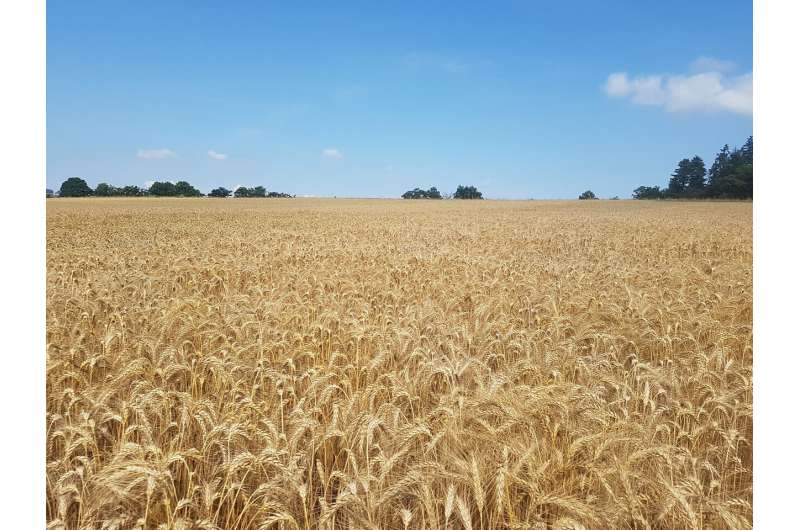This article has been reviewed according to Science X's editorial process and policies. Editors have highlighted the following attributes while ensuring the content's credibility:
fact-checked
peer-reviewed publication
trusted source
proofread
Chemicals from maize roots influence wheat yield

Maize roots secrete certain chemicals that affect the quality of soil. In some fields, this effect increases yields of wheat planted subsequent to maize in the same soil by more than 4%. This was proven by researchers from the University of Bern. While the findings from several field experiments show that these effects are highly variable, in the long term they may yet help to make the cultivation of grains more sustainable, without the need for additional fertilizers or pesticides.
Plants produce an abundance of special chemicals. Some of these are released into the soil and influence its quality. This, in turn, affects the next plant to grow in the soil. So far, little research has taken place on the extent to which the excreted chemicals can be used in agriculture to increase productivity.
Recently, however, researchers from the Institute of Plant Sciences (IPS) at the University of Bern have conducted field experiments in this area. With their findings published in the scientific journal eLife, the researchers demonstrate that specialized metabolitesfrom the roots of the maize plant can bring about an increase in the yields of subsequently planted wheat under agriculturally realistic conditions.
How maize root chemicals affect wheat
On the basis of earlier studies conducted by researchers at the Institute of Plant Sciences (IPS) at the University of Bern, it was known that so-called benzoxazinoids—natural chemicals which maize plants release through their roots—change the composition of microorganisms in the soil on the roots and therefore influence the growth of the subsequent plants that grow in the soil. The present study investigated whether plant-soil feedbacks of this kind also occur under realistic agricultural conditions.
"Such field experiments are essential to test the transferability of basic research into practice and thus assess the potential agronomic benefit," explains Valentin Gfeller, who worked on the project as a doctoral student at IPS and now works at the Research Institute of Organic Agriculture FiBL. During a two-year field experiment, two lines of maize were initially grown, only one of which released benzoxazinoids into the soil. Three varieties of winter wheat were then grown on the differently conditioned soils.
On this basis, it was possible to demonstrate that the excretion of benzoxazinoids improves germination and increases tillering, growth and crop yield.
Fewer pests, same quality
In addition to the increased crop, lower levels of infestation by some pests were also observed. "A yield increase of 4% may not sound spectacular, but it is still significant considering how challenging it has become to enhance wheat yields without additional inputs," explained Matthias Erb, Professor for Biotic Interactions at the Institute of Plant Sciences, who led the study together with Klaus Schläppi of the University of Basel.
"Whether effects of this kind actually make a significant difference for overall agricultural productivity and sustainability remains to be seen, however, as yield also depends on many other factors," explains Erb. The study demonstrates the potential of using specialized plant compounds to improve crop productivity through variety-specific rotations.
Within the framework of the "One Health" Interfaculty Research Cooperation (IRC) at the University of Bern (see box), it was also possible to investigate the quality of the wheat at the level of individual chemical elements. Together with the Institute of Geography of the University of Bern and Agroscope, the Swiss center of excellence for agricultural research, it was possible to demonstrate that the increase in harvest due to benzoxazinoids does not have any negative impact on wheat grain quality.
Plant chemicals persist in the soil
To better understand the underlying mechanism, the researchers completed a variety of analyzes of the soil and roots. The benzoxazinoid-producing plants accumulated these chemicals and their degradation products in the soil close to their roots.
Furthermore, in collaboration with the University of Basel, it was confirmed that benzoxazinoids influence the community of bacteria and fungi in and on maize roots. However, soil nutrients were not altered. Benzoxazinoids also proved to be particularly persistent in the soil. The extent to which wheat growth and overall yield are directly or indirectly affected by benzoxazinoids through soil microorganisms will be subject to further investigation.
Soil properties are important
To test the effects of soil properties, together with the University of Basel and Agroscope, the research team conducted another two-year field experiment to investigate how these plant-soil feedbacks from benzoxazinoids act in a more heterogeneous field. The composition of the soil chemistry and microorganisms in the field in question varied considerably. The researchers succeeded in showing that the influence of benzoxazinoids on the growth and resistance of wheat depends on this different composition.
"A better understanding of the effects of soil properties on plant-soil feedbacks is crucial in terms of the future use in sustainable agriculture," explains Valentin Gfeller.
More information: Valentin Gfeller et al, Plant secondary metabolite-dependent plant-soil feedbacks can improve crop yield in the field, eLife (2023). DOI: 10.7554/eLife.84988
Journal information: eLife
Provided by University of Bern



















